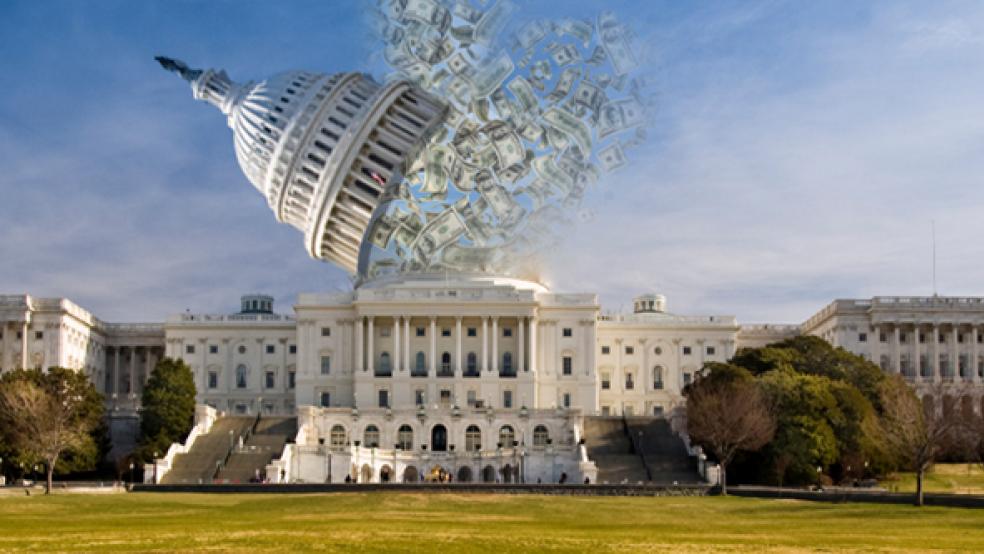If President Biden’s American Jobs Plan and American Families Plan are enacted, trillions of dollars of additional spending will need to be paid for over the next decade. This raises fundamental questions about the size of the government budget and the amount of taxes to be collected now and in the future. Because of the enormous size of the federal debt, even if these policies are not enacted, Congress should no longer put off fiscal responsibility for another day.
The politics are difficult; the policy itself is not. Congress should begin by implementing spending caps and allowing some of the last few years’ spending increases and tax cuts to expire as scheduled.
Many proponents of fiscal responsibility are willing to give the federal government a pass for “massive (mostly justified) short term borrowing to fight COVID-19,” as one Committee for a Responsible Federal Budget (CRFB) publication called it. But now that the shock of the pandemic is mostly behind us, how much spending restraint can we expect from the Biden administration and Congress?
Because a variety of rules and policies influencing the budget are already scheduled to expire this year and beyond, Congress must soon make several important choices.
By proposing various tax increases, the Biden administration has signaled a desire to limit budget deficits. But the revenue it can expect from these tax increases will likely not be enough to pay for proposed new spending programs, let alone the annual deficits that have become the norm. So even if Congress increases spending by half of what the president has proposed, annual budget deficits going forward will be larger than expected.
The CRFB reports that with current spending and tax policy, the national debt will be more than twice GDP by 2051. And with increased spending, who knows how high it could get? It’s highly unlikely that taxes could be increased enough to offset the administration’s proposed spending increases. Tax hikes make for good talking points, but they’re very difficult to accomplish politically. More importantly, taxing the rich usually yields less revenue than proponents expect.
Soaring government debt has real costs that will be experienced by most Americans. The long-term consequences are higher interest rates for borrowers and reduced capital investment in the business world. Reduced capital investment means fewer high-paying jobs and slower income growth.
Under our existing polices, the Congressional Budget Office (CBO) projects that interest on the federal debt will rise from 8% of the budget in 2020 to a staggering 26% by 2051.The Medicare trust fund is expected to run out of money in 2024, and the Social Security trust fund by 2031. The more revenue that must go to pay interest on the debt, the less will be available to make up for these critical shortfalls.
The CRFB lays out some possible steps Congress could take to be more fiscally responsible:
First, institute new discretionary spending caps when the current caps expire on September 30. Since 2012, Congress has been subject to these caps. Though often increased and sometimes violated, they nevertheless impose some discipline on the appropriations process. Having a plan to limit spending each year is an important first step.
Second, allow tax credits and related provisions in the American Rescue Plan (ARP) and other recent stimulus bills to expire as scheduled (mostly during 2021). As the economy recovers, more unemployed workers will be able to go back to their old jobs or find new ones. Thus programs like extended unemployment insurance and temporary tax credits should be allowed to expire.
Generous unemployment benefits give people the freedom to delay finding another job and have made it difficult for some businesses, such as restaurants, to find enough workers as things return to normal. Extending these and other ARP programs indefinitely would cost the government almost $1.8 trillion more than if Congress lets them expire as scheduled.
Third, let several provisions of the Tax Cuts and Jobs Act (TCJA) enacted during the Trump administration expire or phase out as scheduled (between 2021 and 2025), while preserving others. Even without Congress enacting a new tax bill, the government can collect more revenue by combining the scheduled phaseout with other provisions that increase taxes, such as the cap on the amount of state and local tax that can be deducted from the income tax base. This could increase revenue by more than $3.8 trillion over 10 years.
Although these changes may not be enough to control federal debt or forestall the need for reducing Social Security and Medicare benefits in the future, they will be a step in the right direction.
Tracy C. Miller is a senior policy research editor with the Mercatus Center at George Mason University.





